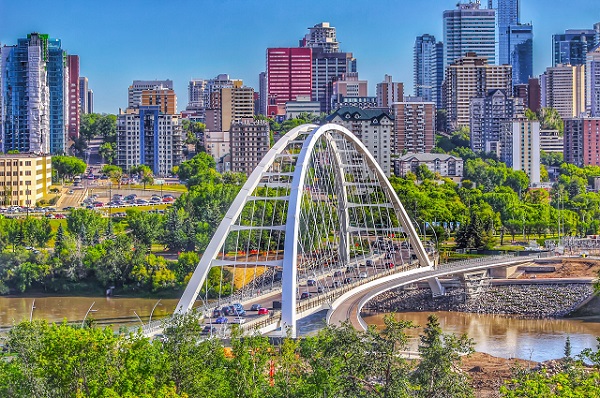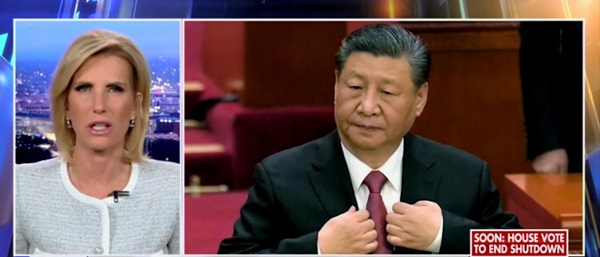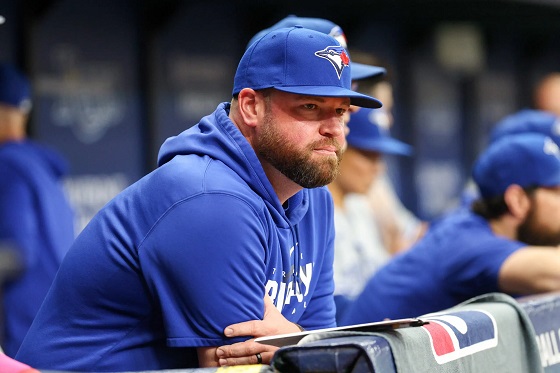Alberta
Edmonton triples venture capital investment in 2023

Alberta’s tech sector continues its strong momentum, with Edmonton seeing its strongest growth ever, proof Alberta remains a hot tech market.
As global and national investment have declined, Alberta has remained a strong tech market and is showing continued leadership, as shown by Pitchbook ranking Calgary as the 12th fastest-growing tech ecosystem in the world and LinkedIn ranking Calgary as one of the best places to hire and recruit tech workers.
At the end of 2023, Alberta’s five-year growth rate for venture capital dollars invested reached an impressive 48.5 per cent, more than triple Canada’s compounded average growth rate of 13 per cent, according to the 2023 Canadian Venture Capital Private Equity Association fourth-quarter report.
The province’s growth rate means Alberta finished 2023 with $707 million invested over 86 deals, in line with Alberta’s 2022 record-breaking year. In contrast, Canada ended the year with a 31 per cent decline in investments. Over the past five years, Alberta technology companies have secured more than $2.7 billion in venture capital funding across 350 deals, creating thousands of jobs for Albertans.
“While Canada as a whole saw massive declines, Alberta has held steady. We are a major venture capital player in Canada, as technology drives growth across all sectors.”
Alberta’s two largest cities continued to attract investment dollars in 2023, with Calgary and Edmonton coming in fourth and fifth respectively for number of deals, with $501 million invested in 64 deals in Calgary and $188 million invested in 21 deals in Edmonton. Edmonton saw a 324 per cent increase from $58 million in 2022 to $188 million in 2023. In total, Alberta captured 10.3 per cent of dollars invested in 2023 and 13 per cent of venture capital deals in Canada.
“Edmonton’s tripling of venture capital investment in 2023 underscores our city’s position as a dynamic tech capital within Alberta’s thriving innovation ecosystem, reaffirming our role as a powerhouse driving technological advancement and economic prosperity across diverse sectors. It is the local innovators’ relentless pursuit of solutions to real-world problems, with the continuing support of the Government of Alberta, which not only attracts significant investment but also propels our city to the forefront of Alberta’s tech revolution and fosters job creation for our community.”
“At Platform Calgary we are working with our partners to continue this momentum by linking up high potential tech startups with the investors that can help them take their businesses to the next level. The evidence is clear, Alberta is emerging as one of the most exciting and resilient tech ecosystems in the world. Together with our growing tech community, we can secure Alberta’s position as the best place in the world for anyone to launch and grow a tech business.”
Alberta remains a growing market for the technology and innovation sector, and Alberta’s government celebrates its steady contribution to the Alberta economy, including in the fourth quarter of 2023. The end of last year saw venture capital investments in the province increase by 35 per cent for dollars invested and 19 per cent for deals closed compared with the third quarter. There were 25 deals closed valued at a combined $173 million in the fourth quarter of 2023.
Related information
Alberta
How economic corridors could shape a stronger Canadian future

Ship containers are stacked at the Panama Canal Balboa port in Panama City, Saturday, Sept. 20, 2025. The Panama Canals is one of the most significant trade infrastructure projects ever built. CP Images photo
From the Canadian Energy Centre
Q&A with Gary Mar, CEO of the Canada West Foundation
Building a stronger Canadian economy depends as much on how we move goods as on what we produce.
Gary Mar, CEO of the Canada West Foundation, says economic corridors — the networks that connect producers, ports and markets — are central to the nation-building projects Canada hopes to realize.
He spoke with CEC about how these corridors work and what needs to change to make more of them a reality.
CEC: What is an economic corridor, and how does it function?
Gary Mar: An economic corridor is a major artery connecting economic actors within a larger system.
Consider the road, rail and pipeline infrastructure connecting B.C. to the rest of Western Canada. This infrastructure is an important economic corridor facilitating the movement of goods, services and people within the country, but it’s also part of the economic corridor connecting western producers and Asian markets.
Economic corridors primarily consist of physical infrastructure and often combine different modes of transportation and facilities to assist the movement of many kinds of goods.
They also include social infrastructure such as policies that facilitate the easy movement of goods like trade agreements and standardized truck weights.
The fundamental purpose of an economic corridor is to make it easier to transport goods. Ultimately, if you can’t move it, you can’t sell it. And if you can’t sell it, you can’t grow your economy.
CEC: Which resources make the strongest case for transport through economic corridors, and why?
Gary Mar: Economic corridors usually move many different types of goods.
Bulk commodities are particularly dependent on economic corridors because of the large volumes that need to be transported.
Some of Canada’s most valuable commodities include oil and gas, agricultural commodities such as wheat and canola, and minerals such as potash.
CEC: How are the benefits of an economic corridor measured?
Gary Mar: The benefits of economic corridors are often measured via trade flows.
For example, the upcoming Roberts Bank Terminal 2 in the Port of Vancouver will increase container trade capacity on Canada’s west coast by more than 30 per cent, enabling the trade of $100 billion in goods annually, primarily to Asian markets.
Corridors can also help make Canadian goods more competitive, increasing profits and market share across numerous industries. Corridors can also decrease the costs of imported goods for Canadian consumers.
For example, after the completion of the Trans Mountain Expansion in May 2024 the price differential between Western Canada Select and West Texas Intermediate narrowed by about US$8 per barrel in part due to increased competition for Canadian oil.
This boosted total industry profits by about 10 per cent, and increased corporate tax revenues to provincial and federal governments by about $3 billion in the pipeline’s first year of operation.
CEC: Where are the most successful examples of these around the world?
Gary Mar: That depends how you define success. The economic corridors transporting the highest value of goods are those used by global superpowers, such as the NAFTA highway that facilitates trade across Canada, the United States and Mexico.
The Suez and Panama canals are two of the most significant trade infrastructure projects ever built, facilitating 12 per cent and five per cent of global trade, respectively. Their success is based on their unique geography.
Canada’s Asia-Pacific Gateway, a coordinated system of ports, rail lines, roads, and border crossings, primarily in B.C., was a highly successful initiative that contributed to a 48 per cent increase in merchandise trade with Asia from $44 million in 2006 to $65 million in 2015.
China’s Belt and Road initiative to develop trade infrastructure in other countries is already transforming global trade. But the project is as much about extending Chinese influence as it is about delivering economic returns.

Piles of coal awaiting export and gantry cranes used to load and unload containers onto and from cargo ships are seen at Deltaport, in Tsawwassen, B.C., on Monday, September 9, 2024. CP Images photo
CEC: What would need to change in Canada in terms of legislation or regulation to make more economic corridors a reality?
Gary Mar: A major regulatory component of economic corridors is eliminating trade barriers.
The federal Free Trade and Labour Mobility in Canada Act is a good start, but more needs to be done at the provincial level to facilitate more internal trade.
Other barriers require coordinated regulatory action, such as harmonizing weight restrictions and road bans to streamline trucking.
By taking a systems-level perspective – convening a national forum where Canadian governments consistently engage on supply chains and trade corridors – we can identify bottlenecks and friction points in our existing transportation networks, and which investments would deliver the greatest return on investment.
Alberta
When Teachers Say Your Child Has Nowhere Else to Go

When educators argue that children who don’t fit their system should have nowhere else to go, you’re witnessing institutional self-interest dressed up as social justice.
A petition is making its way through Alberta that could fundamentally reshape education in the province, and not for the better. The “Alberta Funds Public Schools” initiative, launched by Calgary high school teacher Alicia Taylor, asks a deceptively simple question: “Should the Government of Alberta end its current practice of allocating public funds to accredited independent (private) schools?”
Taylor isn’t just any teacher. She’s a Calgary district representative on the Alberta Teachers’ Association’s governing council. And while the ATA has been careful to maintain that this is Taylor’s personal initiative, they’ve conspicuously failed to repudiate it. In fact, ATA president Jason Schilling has publicly stated that members “take exception” to public dollars going to private schools, while simultaneously claiming the association’s policy isn’t “against private schools.” This is the kind of rhetorical contorsions that deserves scrutiny.
The timing is telling. The petition was approved just as 51,000 Alberta teachers launched the province’s first-ever province-wide strike. Taylor called this “a happy accident,” noting that striking teachers now have “a little more spare time than normal” to collect signatures. When your “personal initiative” coincidentally launches during a labor action and benefits from union members’ sudden availability, reasonable people might wonder how personal it really is.
To be fair, let’s present the strongest version of the argument Taylor and her supporters are making. They claim that Alberta spends the least per student in Canada on public education while funding private schools at 70%, the highest rate in the country. This creates what they see as a perverse incentive structure: public money flowing to selective institutions while universal public schools struggle with overcrowding and teacher shortages.
The math seems straightforward: $461 million currently goes to independent schools serving about 50,000 students. Redirect that money to the public system serving over 600,000 students, and you could fund thousands of teachers and educational assistants. You could reduce class sizes. You could provide more support for struggling students.
They argue this is about fairness and democratic accountability. Taxpayers fund education for the common good, and that investment should go to schools that must accept every student, not selective alternatives that can charge tuition on top of public subsidies. Private schools exist and thrive in Ontario without public funding. Why should Alberta be different?
Moreover, they contend, the current system subsidizes exit from the public system, creating a vicious cycle where families with resources opt out, taking their advocacy and engagement with them, leaving behind an increasingly residualized public system serving the most vulnerable students.
Underlying much of this argument is a class-based resentment: the notion that some families can access alternatives amounts to unfair privilege. This framing reveals more about the advocates than about education policy. Envy is never a good look in educators. When teachers’ unions frame educational choice as a problem because some families have options others don’t, they’re not arguing for equity. They’re arguing for enforced equality of limitation, where if not everyone can have something, no one should.
It sounds compelling. It’s also dangerously wrong.
Let’s start with the most fundamental flaw in this argument: taking the money doesn’t make the students disappear. Nearly 50,000 students attend independent schools in Alberta, plus another 8,000 in private early childhood programs. These children don’t vanish if funding is eliminated. They flood into a public system that petition supporters themselves admit is already overcrowded. The math is straightforward: forcing these students back into public schools would cost taxpayers an additional $300 million, more than the government’s most recent settlement offer to teachers. This is about forcing conformity at massive cost, while improving nothing.
But the financial argument, while important, pales beside the human cost. Consider what this petition really proposes: eliminating educational options for approximately 80% of independent school families whose income is at or below the provincial average. These aren’t wealthy elites. They’re middle-income families making sacrifices to access education that works for their children.
The class warfare rhetoric of the petition obscures this reality. When advocates frame school choice as privilege, they ignore that Alberta’s funding model specifically makes choice accessible to families who couldn’t otherwise afford it. Eliminating this doesn’t level the playing field. It simply ensures that only the truly wealthy retain educational options.
Here’s what makes this proposal particularly egregious: its devastating impact on neurodiverse learners. Many of the fastest-growing independent schools in Alberta serve students with special learning needs. These are children who struggled, or failed, in standard public school classrooms. They’re students with ADHD who need smaller classes and more movement. They’re autistic students who thrive with structured routines and specialized approaches. They’re kids with dyslexia who need intensive, systematic literacy intervention that their public school couldn’t provide.
The petition’s supporters blithely suggest these students should return to the very system that couldn’t serve them. When teachers are striking over classroom complexity and overcrowding, the proposed solution is to add tens of thousands more students, many with intensive needs, to those same classrooms. This is illogical and cruel.
The ATA argues that a “well-funded public system should be meeting the needs of those kids in the first place.” Should. That’s doing a lot of work in that sentence. Yes, the public system *should* meet every child’s needs. But it doesn’t. And there’s no evidence that simply throwing more money at the problem will change that.
Whatever challenges Alberta’s public schools face, it’s naive and simplistic to believe more money will fix them. There is no study in the world that connects higher teacher wages with better educational outcomes. The problems in public education are complex, structural, and often resistant to solutions that amount to “spend more.”
Neurodiverse students aren’t one-size-fits-all. A student who thrives in a Montessori environment with hands-on learning and self-directed exploration might struggle in a traditional classroom. A student who needs the structure and explicit instruction of a classical education might flounder with inquiry-based learning. An autistic student might do brilliantly in a small school with consistent routines and sensory-aware design, but melt down daily in a crowded comprehensive school.
Eliminating funding for independent schools eliminates options, period. It tells families: your child must fit into our system, or fail. For neurodiverse learners, this is often a sentence to years of struggle, frustration, and educational failure.
But this goes beyond neurodiversity. It’s about every kind of educational diversity. Alberta’s independent schools include French immersion programs, Indigenous-focused schools, classical academies, arts-intensive programs, schools with specific pedagogical approaches, faith-based education reflecting diverse religious traditions, and schools serving new Canadian communities with specific cultural and linguistic needs.
This is educational pluralism: the recognition that in a diverse democracy, different families have different values, different children have different needs, and no single approach serves everyone well. The ATA’s position, however much they try to obscure it, is that this diversity is a problem to be solved. That public money should only support one kind of school: the government-run, union-staffed, standardized public school. Every other option should be available. if at all, only to families wealthy enough to afford full-freight tuition.
This entrenches inequality rather than reducing it. Right now, Alberta’s funding model democratizes choice. A middle-income family whose child isn’t thriving in public school has options. Eliminate public funding, and those options exist only for the wealthy. The result is a rigid two-tier system where the rich can escape and everyone else is trapped.
The envious framing of the ATA’s position becomes clearer here. They see that some families can access alternatives and conclude the problem is the alternatives, not the lack of universal access. This is the logic of enforced mediocrity: if we can’t give everyone excellent options, we’ll eliminate the excellent options that exist. It’s a race to the bottom masquerading as equity.
Let’s be honest about what’s really happening here. The ATA represents teachers in public schools. It has no role in independent schools. Every student in an independent school is a student in a classroom where the union has no power, no collective bargaining rights, and no ability to call strikes that disrupt families.
When Taylor notes that families with children in independent schools experienced “business as usual” during the strike while public school families scrambled for childcare, she’s unwittingly making the case against her own position. Educational diversity means resilience. It means not every family is held hostage to a single system’s labor disputes.
The union has an institutional interest in maximizing enrollment in schools where it holds power. This petition advances that interest. That’s no coincidence. The careful distance the ATA maintains (“It’s not our petition, but we agree with its goals”) is transparent political cover.
Here’s the assumption underlying this entire petition: if we eliminate alternatives and force all students into the public system, somehow that system will improve. This is supremely naive. Suppressing educational variety and choice won’t improve the ails of the public system. It will simply trap more students in whatever problems already exist. If public schools are struggling with classroom management, adding students who left won’t help. If they’re struggling with diverse learning needs, adding students with intensive special needs won’t help. If they’re struggling with overcrowding, adding 50,000 more students certainly won’t help.
The theory seems to be that if we eliminate choice, the system will be forced to improve to meet everyone’s needs. But that’s not how monopolies work. When you have captive customers with no alternatives, the pressure to improve actually decreases. Competition, choice, and the possibility of exit are what create pressure for systems to innovate and serve their clients well.
Educational diversity makes everyone better off. It provides options for students who struggle in traditional settings. It allows innovation and experimentation. It respects that families have different values and priorities. It creates competitive pressure that benefits all schools. And it even costs taxpayers less because families contribute tuition on top of partial public funding.
The Taylor petition claims to be about fairness and adequate resources. In reality, it’s about control and conformity. It would devastate neurodiverse learners, reduce educational variety, eliminate options for middle-income families, and force tens of thousands of students into an already overcrowded system, all while costing taxpayers hundreds of millions more.
And for what? The promise that somehow, magically, removing alternatives will make the remaining system better? That’s wishful thinking dressed up as education policy.
The ATA may not have officially endorsed this petition, but they haven’t repudiated it either. Their silence is instructing, considering that no one would benefit most from the success of such petition than the ATA. And Alberta families, especially those with children who learn differently, should pay attention to what that silence means for their future choices.
When Taylor launched this petition as a “Calgary district representative on the Alberta Teachers’ Association’s governing council,” whatever the pretense of privacy, she wasn’t acting in a vacuum. When the ATA president publicly supports the petition’s goals while maintaining plausible deniability about its origin, that’s a political strategy. When striking teachers use their “spare time” to collect signatures for a petition that would eliminate non-union schools, that’s campaign coordination.
The envious rhetoric about “privilege” and “fairness” obscures what this petition does. It doesn’t help struggling students. It doesn’t improve public education. It doesn’t create equity. It eliminates options for middle-income families. It’s the worst kind of class politics: making everyone worse off in the name of equality.
Educational diversity is a necessity for a functioning pluralistic society. It’s essential for neurodiverse learners who don’t fit the standard mold. It’s crucial for families who want education that reflects their values. And it’s fundamental to the idea that parents, not government bureaucrats or union officials, should have the primary say in their children’s education.
Any proposal to eliminate educational diversity, whatever its rhetorical packaging, deserves to fail. And Albertans should see this petition for what it truly is: an institutional power play to eliminate competition and force conformity, motivated more by envy than by any genuine concern for educational outcomes.
The stakes are high. Educational freedom, once lost, is extraordinarily difficult to regain. When educators tell you that children who don’t fit their system should have nowhere else to go, believe them. Then fight back. Alberta families should resist this petition with everything they have.
For the full experience, and to help us bring you more quality research and commentary,
please upgrade your subscription.
-

 armed forces1 day ago
armed forces1 day agoCanadian veteran says she knows at least 20 service members who were offered euthanasia
-

 Frontier Centre for Public Policy17 hours ago
Frontier Centre for Public Policy17 hours agoRichmond Mayor Warns Property Owners That The Cowichan Case Puts Their Titles At Risk
-

 Automotive2 days ago
Automotive2 days agoThe high price of green virtue
-

 Daily Caller1 day ago
Daily Caller1 day agoLaura Ingraham’s Viral Clash With Trump Prompts Her To Tell Real Reasons China Sends Students To US
-

 Business17 hours ago
Business17 hours agoSluggish homebuilding will have far-reaching effects on Canada’s economy
-

 Business2 days ago
Business2 days agoCarney shrugs off debt problem with more borrowing
-

 Business15 hours ago
Business15 hours agoMark Carney Seeks to Replace Fiscal Watchdog with Loyal Lapdog
-

 Bruce Dowbiggin2 days ago
Bruce Dowbiggin2 days agoMaintenance Mania: Since When Did Pro Athletes Get So Fragile?














